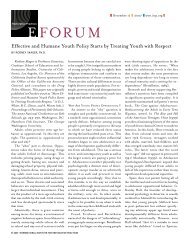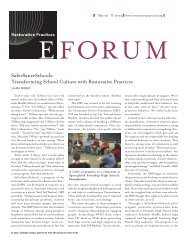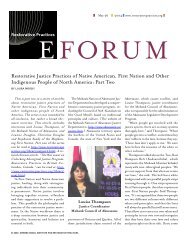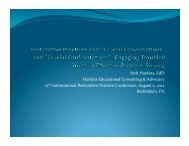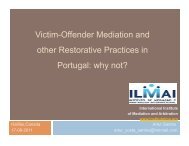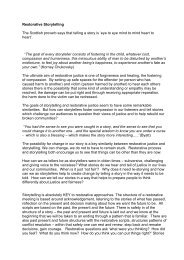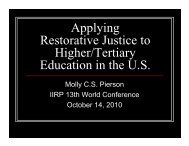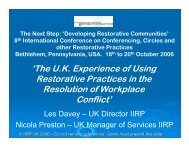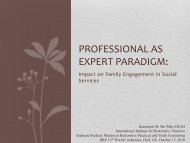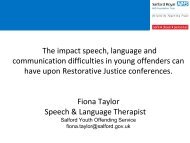Between Wholeness and Restoration - IIRP
Between Wholeness and Restoration - IIRP
Between Wholeness and Restoration - IIRP
Create successful ePaper yourself
Turn your PDF publications into a flip-book with our unique Google optimized e-Paper software.
directly affected. Though he tends not to elaborate on this concept, British researcher<br />
Charles Barton (2003), in response to viewing restorative justice in opposition to<br />
retributive justice, chooses instead to theorize further on the possibility that restorative<br />
justice is grounded in a theory of empowerment. In my opinion, Zehr would not oppose<br />
Barton’s ideas but see them as an extension of his own.<br />
In summary then, within this paradigm what theory of restorative justice emerges I<br />
would infer that Zehr believes restorative justice changes lives because people inherently<br />
know their sense of wholeness <strong>and</strong> worth is dependent on their relationships with others.<br />
When they have been violated, they desire shalom, which can only occur through dialog<br />
which creates the space required for the worth of all involved to be revealed to each<br />
other. After examining Zehr’s work closely, I might also conclude that though he is<br />
credited with developing the traditional underst<strong>and</strong>ing of restorative justice by<br />
contrasting it to retributive justice, his heart seems more attuned to a notion of restorative<br />
justice being grounded in a theory of relationship/community.<br />
Theorizing Restorative Practices<br />
Restorative practices, having grown out of the field of restorative justice, is a very<br />
young in terms of being a field of research. Ted Wachtel, one of the earliest researchers<br />
involved in developing the concept of restorative practices, first began writing about it in<br />
1997 after he observed some early stages of its use in Australia where he reports the first<br />
restorative family group conference took place in a school in 1994 (Wachtel, 1997, p.<br />
124). In desiring to prevent serious wrongdoing in schools as opposed to the treating<br />
the results of misbehaviour he saw the need for the development of restorative school



